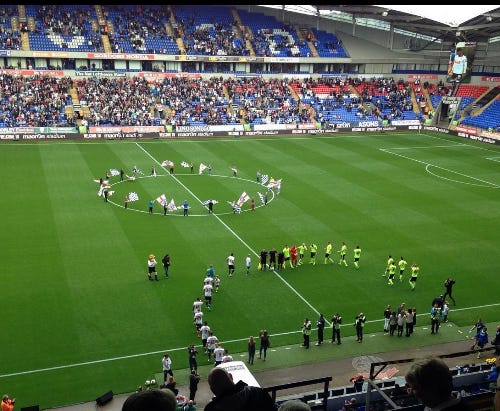Soccer Travels: Bolton Wanderers, Birmingham City, a pint, and a pie
The first time I stepped off the train at Bolton’s Horwich Parkway, I was overcome by the smell of cow shit. Not since my father sold the family dairy farm in Missouri had I been hit with such a pungent smell of cattle faeces.
It is amazing how our brains and noses are wired. The smell of cow shit provides me with a feeling of a home I left nearly two decades ago. Tears filled my eyes, and I wiped them away to see a stadium rising in the distance. I had arrived at the home of Bolton Wanderers.
Horwich Parkway is a small train station and if the train doesn’t stop from Manchester to Blackpool, passengers would most likely not notice unless they knew to look out for Bolton Wanderers’ home ground. On the day I visited the stadium to watch a Bolton match for the first, it was a chilly day in May. Grey clouds settled in overhead threatening everyone in Greater Manchester with rain. Despite the calendar saying summer was about to dawn, the weather in the northwest of England had other ideas, as it often does.
Horwich Parkway is an open-air, rural station that takes less than a minute to exit. There were only two lines passing through the small station and a ticket booth that wasn’t always occupied. It is the type of train station in the middle of a line that runs between two points people want to get to. If you don’t live or work around the Horwich area, you wouldn’t likely stop off at the station.
I exited the railway station and was quickly greeted by the sight of Bolton Wanderers’ Macron Stadium. The ground has gone through a few names over the years, but on this day in May 2015, it was known as the Macron due to the Italian sportswear company’s sponsorship of the ground. From July 2023, the ground will be known as the Toughsheet Stadium due to a new sponsorship deal with a local business. Money talks in modern sports and owners will happily allow their arenas to have stupid names.
Despite the name changes over the years, I still call the stadium by its old name, the Reebok. Indeed, most people around the Greater Manchester area still refer to the stadium by its old name rather than any of its new monikers.
The Reebok shoe company was founded in Bolton and its history within the city remains. Bolton was once a thriving factory town north of Manchester. The cotton and materials were transported from the docks of Liverpool to the factories around the city. Unfortunately, Bolton wears the scars of the industrial past these days. Poverty is a problem in and around Bolton. The jobs left but the people stayed. According to a 2022 report, “Bolton's rate of child poverty is the third highest in Greater Manchester with more than half of children below the breadline in one area.”
It wasn’t just textile factories around the city. The Warburton’s bread company is headquartered in Bolton and the family has sponsored Wanderers throughout the years. There was also a Halls cough drop factory in the city. According to Jason McAteer’s autobiography (an excellent read), Bolton Wanderers used to train on the premises of the Halls Factory (or at least in its shadows) during the early 1990s. The smells emanating from the factory were nauseating.
Opened in 1997, the Reebok (which is what I will refer to the ground as) replaced Burnden Park. The old Burnden Park ground was home to Wanderers from 1895 until it was demolished in 1997. The Reebok was a sign of the times that Bolton were no longer a lower-division regional club with limited funds. The ground was an omen of the good times to come at Wanderers, although they would ultimately be fleeting.
All roads from Horwich Parkway train station lead to the home of Bolton Wanderers. The Reebok was built well outside the city centre like many modern-day grounds around the United Kingdom. The cost of building new stadia in the middle of cities and towns is too great, and the space required is too much. Therefore, many teams remodel ageing stadia or build outside of town. There are no tax breaks or council funding help for building new stadiums. Clubs must build them with their own funds. Towns around Britain have enough to do without donating land or money to the building of a sports venue.
The Reebok reminded me of Stoke City’s Bet365 Stadium, Wigan Athletic’s DW Stadium, and Huddersfield’s John Smith’s Stadium. It had a similar look and feel. There is a 1990s-style design that these stadiums all share. They are practical, functional, and lack the character of Anfield or Old Trafford.
The stadium is about three football fields away from the train station exit and the area around it resembles America rather than England. Farmland and hills meet retail parks and chain stores, which makes you feel far away from the city centre of Bolton - which isn’t a bad thing. There are restaurant chains, coffee shops, and Bolton Arena (an extensive exercise and leisure centre) between the station and the stadium.
The Reebok Stadium is located next to the Middlebrook retail park. Rather than the old-school pubs and takeaways you find near some stadiums around England, the Reebok is situated on the doorstep of modern restaurants and fast food chains. The retail park makes the area around the Reebok a destination.
One of the great things about the Reebok is you can walk right up to the stadium itself. Once you get into the stadium’s outer walls, you are inside the ground. In front of the main stand is a Nat Lofthouse statue. The Bolton great led the team to the 1958 FA Cup trophy. He was also Footballer of the Year in 1952-53.
On a previous visit to the Reebok, I watched a collection of supporters gather near the Nat Lofthouse statue, waiting for the players to board the team coach for an away match. The players signed autographs and snapped selfies with fans, providing a link between the club and the community.
Over the course of two and a half years, I worked in the education department for Bolton Wanderers. I spent the working week at the Reebok, teaching students, with a constant view of the pitch. It afforded me some free tickets to matches and the chance to meet some players. I also watched first-team training sessions and practice matches when I was supposed to be teaching.
I also got to play a match on the pitch, which was a claustrophobic experience. The stands rise up on all four sides, making the pitch seem very narrow. The field itself doesn’t feel as long or wide as it does when you are sitting in the stands. I have never played professional football but I could only imagine the fans being on top of me during a heated match. No wonder the pressure is so high at top-level clubs.
On this chilly day in May, I was at the Reebok to watch Wanderers play Birmingham City. It was the final day of the 2014-15 Championship campaign. Bolton had just missed out on the Championship promotion playoffs and neither team had anything to play for on the final day.
The dark clouds over Greater Manchester finally let loose of the rain it had been holding. A quick meat pie and a pint of beer filled my stomach after making the train journey. You can’t go to see a football team in the northwest without eating a pie. It is the equivalent of eating a hot dog at a baseball game in the States or chewing on sunflower seeds on the terraces of a football match in Eastern Europe.
I sat up high with a great view of the pitch. While the Reebok and similar stadiums do not have the character of Anfield or Old Trafford, they do have perfect sight lines. You won’t have a bad view of a match. Although I love Anfield and watching Liverpool play, the stadium feels cramped and depending on your seat, it can be difficult to see the action due to views being obstructed. Sitting up high kept me dry, as the May mist engulfed the players below.
The match was uneventful with neither team able to finish in the top six. Despite Bolton’s constant prodding and probing, it was Birmingham City who scored the match’s only goal. Robert Tesche scored in the 42nd minute to give the Blues the lead and eventually the win.
Financial issues inundated Bolton Wanderers over the next few years leading to relegation from the Championship. Administration led to Bolton selling some of their assets, including one of their two training grounds – which Preston North End purchased. While working in the education department, I spent many hours at the training ground, taking in the views of the many training pitches in the glorious sun of the northwest.
The club will play the 2023-24 campaign in the English third division (League One) once more. Bolton remain a team with strong local support. But with the financial issues experienced by many lower league clubs – including local rivals Wigan Athletic – it feels like the future could continue to be difficult for Wanderers.
Football is a game of the haves and have-nots. Northern clubs with limited fanbases may struggle in the future to play a major role in top-tier English football.








